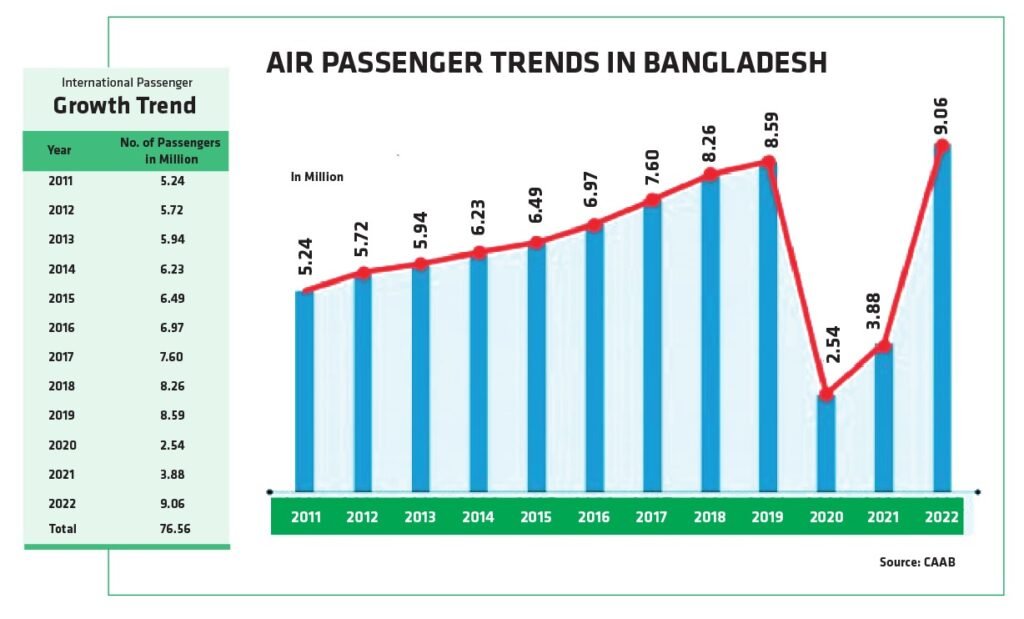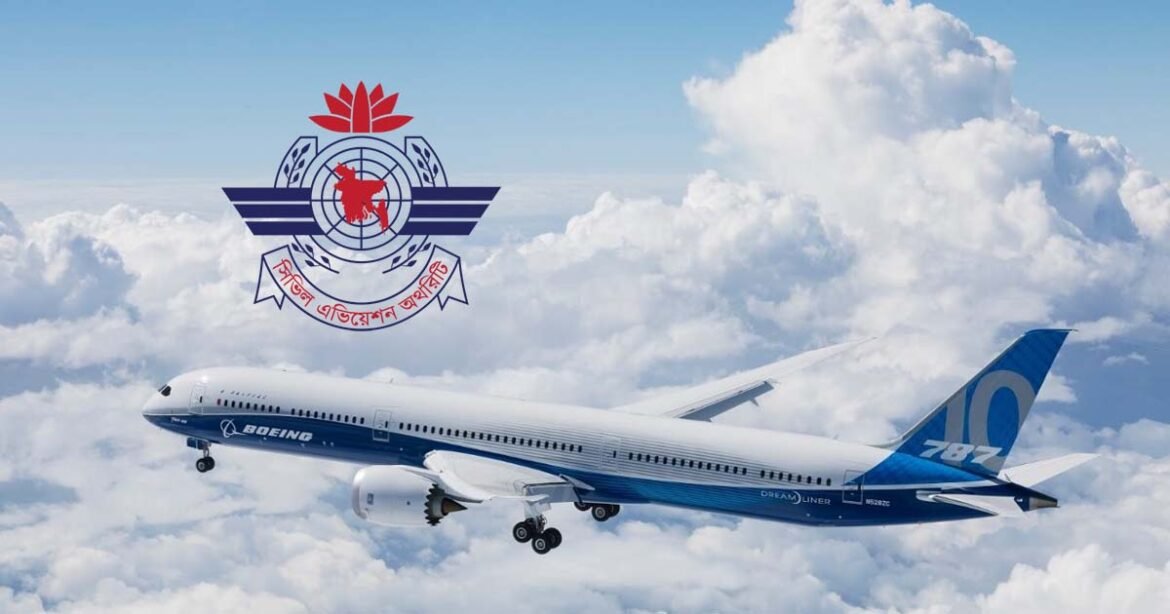Bangladesh’s aviation industry is poised to experience significant growth and development, as evident from recent initiatives and collaboration. Leading aircraft manufacturers Boeing and Airbus have shown keen interest in the country, offering advanced aircraft models and expanding their presence. Additionally, several foreign airlines have recognized the potential of Bangladesh’s growing market and expressed a desire to establish connections, creating new opportunities for travel, trade, and economic development. These boosts signal a positive trajectory for the country’s aviation ecosystem, with potential benefits for tourism, economy, and connectivity.
You can also read: Turkish general election: Erdogan to enter third decade in power
The passenger market in Bangladesh aviation industry shows significant potential for growth, with an estimated value of $600 million to $700 million and an annual growth rate of 8% to 10%. According to the International Air Transport Association (IATA), air transport in Bangladesh is projected to increase substantially, with passenger departures expected to reach 12.1 million to 30 million by 2038. This growth can contribute to GDP growth and job creation. Domestic airlines have expanded their routes, and international airlines have recognized the market potential and expanded their operations to and from Bangladesh. The government’s efforts to promote tourism and enhance airport infrastructure have also played a role in this growth.


Similarly, the air cargo market in Bangladesh is projected to outpace the world average, with forecasts indicating 1.1 million tonnes of cargo by 2041. Developing a dedicated national cargo operation and expanding Biman Bangladesh Airlines’ passenger fleet are vital for boosting GDP and achieving the goals outlined in Vision 2041. The future prospects for the aviation sector in Bangladesh are promising, with improved services, competitive fares, better merger offers, and enhanced travel experiences expected.
Let’s delve into the latest key advances that have set the stage for the country’s aviation industry to soar to new heights-
1. Airbus’s mega plan for Bangladesh’s aviation ecosystem
Airbus, a prominent aircraft manufacturer, has unveiled an ambitious plan to develop an aviation ecosystem in Bangladesh. Airbus plans to develop Bangladesh’s aviation ecosystem by setting up an ab initio school in Lalmonirhat to produce commercial pilots and mechanics. This initiative aims to save foreign currency by training pilots domestically and support the growth of the aviation industry. Airbus has signed an agreement with Bangabandhu Sheikh Mujibur Rahman Aviation and Aerospace University for this purpose. The comprehensive package offered by Airbus includes supporting higher education institutions, improving air traffic services, enhancing the skills of aviation personnel, and addressing environmental challenges.
The memorandum of understanding (MoU) signed between the Bangladesh government and the UK government includes a long-term plan for developing aviation infrastructure. Airbus will provide strategic advice and marketing services to Biman Bangladesh Airlines and help them maximize the utilization of aircraft, expand routes, and generate more revenue. The partnership aims to boost the aviation industry, promote bilateral trade, and reinforce Bangladesh’s position as an aviation hub. This collaboration between governments eliminates the possibility of third-party commissions and strengthens trade relations between Bangladesh, Germany, France, Spain, and the UK.
2. Boeing’s latest offer: The 787-10 Dreamliner
Boeing, one of the world’s largest aerospace companies, has extended an enticing offer to Biman Bangladesh Airlines. The offer includes Boeing’s latest aircraft model, the 787-10 Dreamliner. This state-of-the-art aircraft boasts enhanced fuel efficiency, passenger comfort, and a greater range, making it an ideal choice for Biman Bangladesh to expand its fleet and cater to long-haul international routes. The potential acquisition of the 787-10 Dreamliner represents a significant leap forward for Biman Bangladesh in terms of operational efficiency and passenger experience.
3. Foreign airlines eye Bangladesh’s growing market
Foreign airlines are eyeing Bangladesh’s growing aviation market to extend their routes and tap into the country’s economic potential. At least eight international airlines want to connect with Bangladesh to accommodate rising air travel and cargo demand.
With Dhaka airport’s third terminal’s soft inauguration, the number of foreign airlines operating in Bangladesh is likely to rise to 40 from 33. The Civil Aviation Authority of Bangladesh (CAAB) has already granted Egypt Air and Ethiopian Airlines permission to operate flights from Bangladesh, and Wizz Air from Abu Dhabi is currently undergoing the approval procedure.
Additionally, efforts are being made to launch service by Pakistan International Airlines (PIA), Iraqi Airways, Royal Jordanian Airlines, Air France, and others. Discussions have been held with French authorities, and talks will be initiated with Air Canada. More airlines are anticipated to connect with Bangladesh or explore code-sharing agreements after the New York trip begins. Additionally, British Airways, Garuda Indonesia, and SpiceJet from India have expressed interest in flying to Bangladesh. In addition, SpiceJet is planning to begin flights from India’s northeast region to Bangladesh by the end of June, connecting Agartala with Chattogram.
These collaborations will not only improve connectivity, but also increase competition among airlines, which will likely result in more options, enhanced services, and competitive fares for passengers.
How will these deals help Bangladesh’s aviation industry?
Addressing pilot shortage and driving progress:
Airbus’s entry into Bangladesh is expected to address the shortage of pilots in the country’s aviation industry. With the establishment of the ab initio school, pilots, mechanics, and engineers can be trained domestically, reducing training costs and meeting the industry’s demand. The addition of Airbus aircraft to the fleet of airlines like US-Bangla will contribute to the growth of the industry and provide training opportunities at a lower cost. Airbus’s involvement in developing the aviation infrastructure and ecosystem is seen as a positive development for Bangladesh’s aviation industry.
Boosting tourism and economic growth:
The advancements in Bangladesh’s aviation sector have the potential to propel tourism and stimulate economic growth. The introduction of advanced aircraft models, such as Boeing’s 787-10 Dreamliner and Airbus’s A350, ensures a comfortable and efficient travel experience for international visitors. Enhanced connectivity offered by foreign airlines opens up new avenues for tourism, attracting more travelers to explore the country’s vibrant culture, historical sites, and natural beauty. Additionally, increased air cargo capacity facilitates international trade, enabling businesses to expand their operations and contribute to economic development.


Ensuring sustainable growth and collaboration:
As Bangladesh’s aviation sector expands, it is crucial to prioritize sustainability and collaboration. The government, industry stakeholders, and manufacturers must work together to implement environmentally friendly practices, invest in infrastructure development, and ensure safety standards are met. Partnerships between domestic and foreign airlines can foster knowledge transfer and skill development, supporting the growth of local talent and expertise. By adopting a collaborative approach, Bangladesh can build a robust aviation ecosystem that meets international standards while benefiting its economy and people.


